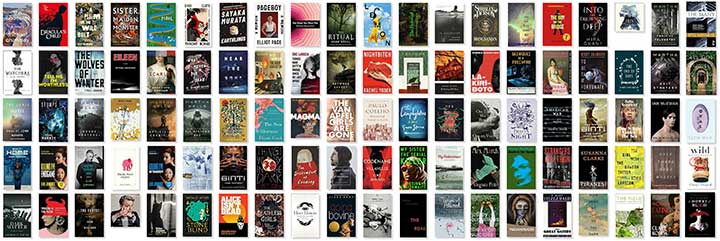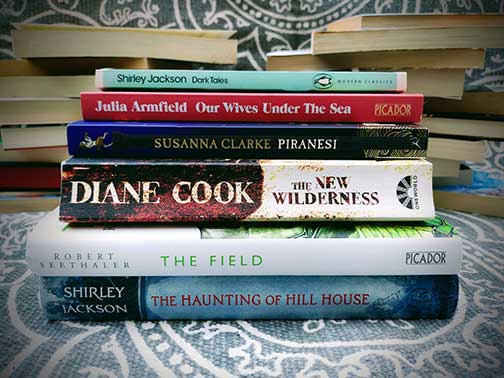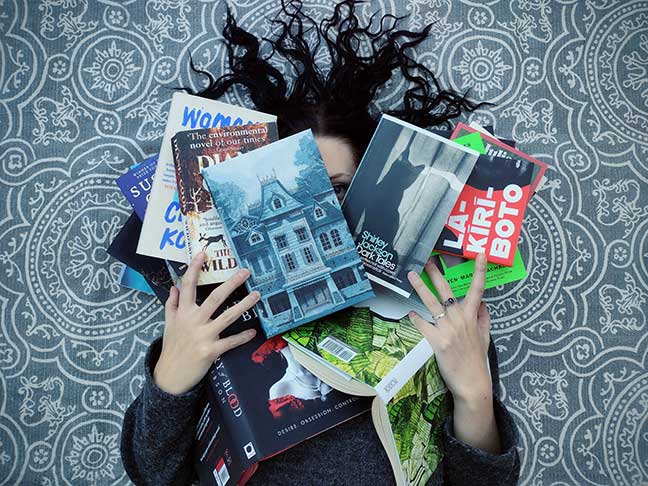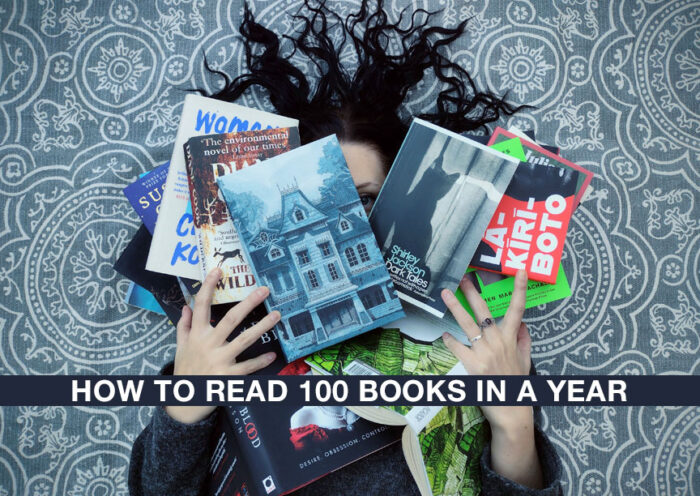How to Read 100 Books in a Year
by CL Glanzing

Reading one hundred books in a year is probably not that unusual. And yet, when I mention it to friends or colleagues, they look surprised.
Why?
I could never do that.
Now you’re just showing off.
Well, contemporary wisdom (i.e. Instagram) states that your 30s are the time for unlearning all the conformity you learnt in your 20s and returning to the feral weirdo you were as a child.
If you asked me where I could be found between the ages of 4 and 10, the answer would probably be reading a book. Under my bed. Under a chair. Upside-down on the monkeybars – now there was a trick that required discipline.
As an only (lonely) child with a Montessori school background, I was used to entertaining myself. And what better adventures could I possibly experience than the ones flickering in my mind? Ghosts, dragons, elves, mysteries, children living off the land or surviving in the woods. Books were easier to operate than a VCR.
Then, I transitioned into an ordinary, American-style Elementary school with schedules and designated snack-time, and books in a completely separate wing of the building.
I discovered quickly that reading carried no social capital. No one cared that I could read. In fact, two teachers told me to slow down – and not make the other kids feel bad. My fifth grade teacher took Hatchet by Gary Paulsen out of my hands on the playground and demanded that I go engage with the other kids.
One year, I decided to read all the books nominated for a YA award. I was terrible at sports, but having a little reading goal set a thrill inside me. I was competing against myself. It was the ultimate game of solitaire. I wasn’t looking for praise or validation, but when I finished all thirty nominated books, I genuinely felt alone in accomplishment. I’m sure that people who collect belly button lint must feel the same way.
So my hobby, along with so many other childhood hobbies, dwindled. I only read books assigned by school or university courses. I would still buy books, ones I thought would look intellectual and interesting on my shelves, and never crack the spines. During one particularly stressful exam period, I just opened fiction books at random – the middle of the fucking book – and read until I fell asleep. I couldn’t commit.
In January 2020, I decided to cauterise my festering reading habits and engage in some serious exposure therapy: 20 books in 2020. Incredibly, I achieved this goal and it was due to two factors: a pandemic and moving to a country with free libraries. Like for most people, lockdown was confrontational about how I spend my time. What do you do with the hours you should be commuting, socialising – doing literally anything outside your apartment?
But the greatest gift I received was access to a public library. ‘You know these books are free, right?’ I want to shout as I grab library patrons by the lapels.
I have actually only bought one book this entire year.
It would be impossible for me to afford to purchase 100 books per year. Let alone house them, or reconcile the environmental impact. (Would I recycle them? Pass them on? Self-entomb using them as bricks?)
I have never been more aware that access to books is a privilege. Literacy itself is a privilege.
If you don’t have a library card, I strongly urge you to get one (even if you don’t think you’ll use it) just to bump up the recorded number of users. Local authorities are so quick to close libraries thinking it’s an easy way to save money. But we have a duty to keep them funded. Libraries provide free information for those who may not be able to afford access to books, audiobooks, or the internet.
Does borrowing from libraries still support authors? Absolutely. Publishers like to allege that library sales impede their profitability (which is convenient when publishers set prices and royalties). But libraries often pay two or three times the retail cost of a book, and have a demand to buy multiple copies if it’s popular. Some libraries even have a pay-per-use system where authors get royalties for every check-out. And who says you might not go and buy the book later if you really like it? Bookshops and libraries are not mutually exclusive ideas.

But enough about that.
After I managed to read 20 books in a year, of course I needed to up the ante. 40 books. Then 60 books. And then, here we are, 100 books.
The truth is that I could not have read so many books without the work of some truly extraordinary authors. Their words inspired me, delighted me, comforted me, and made me feel grateful to be alive.
My tastes may not be for everyone, but looking back over my 15 favourite reads (or re-reads) of 2023, I realise how haunted this list is.
Firstly, haunted locations – chilling places full of mysterious atmosphere, poignant memories, or inexplicable tragedies.
The Field by Robert Seethaler showed me the entire history of a small Austrian town, told by the residents of their local cemetery, with tender poetry akin to Spoon River Anthology. Then there are the desolate, apocalyptic landscapes. I starved and despaired with a man and his son in The Road by Cormac McCarthy and then I starved and despaired again with a group of forgotten women in I Who Have Never Known Men by Jacqueline Harpman. Books like these make us wonder: How could this happen? And then, worse, Could this happen to me? What would I do?
When I’m in a reading slump, I reread Shirely Jackson, inarguably one of the greatest writers in history (excuse me while I blow a kiss to her framed portrait on my desk). Dark Tales is a masterclass in horror short story writing. I re-read The Haunting of Hill House, which happens to be one of my favourite books ever. And then I had the privilege of reading this book’s modern reincarnation in Tell Me I’m Worthless by Alison Rumfitt. A love letter to Jackson with all the horrifying fears that queer and trans people face on a daily basis.
Then there were the haunted spaces of transformation. Our Wives Under the Sea by Julia Armfield brought me to tears with her superb writing, beautiful metaphors, and a love threatened by a supernatural transformation. Perfect for fans of The Southern Reach Trilogy or Love and Other Thought Experiments. Not all haunted spaces are inherently malevolent though, as can be seen in Piranesi by Susanna Clarke, which is a truly joyful exploration of a surreal environment. Sister Maiden Monster by Lucy A Snyder made me mutter out loud, “fucking genius” several times. Zombies, octopodes, pandemics, cosmic beings, and queerness. What more could I want?
Secondly, there are haunted characters – people stalked by their past and difficult choices, unable to cope with their present surroundings. I adore these psychology-driven works, perhaps because they make the mess inside of my own head seem just as comprehensible.
You Know You Want This by Kristen Roupenian was un-put-downable. Wonderfully grotesque character examinations in a stellar collection of short stories. You would think she couldn’t outdo Cat Person, but she can. On a train journey, I listened to the audiobook version of On Earth We’re Briefly Gorgeous by Ocean Vuong, and heard the author himself narrate vignettes of intergenerational trauma, immigrant identities, and queer first love, as tears ran down my face under my N95 mask.
Mrs March by Virginia Feito has already received so much praise this year, there’s little I can add to it, except saying that it is worth the hype – like The Driver’s Seat meets Mrs. Dalloway. There’s nothing I love more than a messy, female protagonist. And I got her in spades with Nightbitch by Rachel Yoder. A feral scream of female rage that I encourage all women to read – whether you have children or are childfree. I enjoyed seeing women blossoming in callous wildernesses. Once There Were Wolves by Charlotte McConaghy gave me a haunted protagonist trying to save a dying species. The New Wilderness by Diane Cook is another favourite re-read, telling the complicated, resentful story of a mother and daughter surviving in a national park as part of a climate change experiment.
You may think that 15 treasured books out of 100 (15%) are low odds, and make the process hardly worth the outcome. But you would be wrong.
I wish everyone in the world were as privileged as me to be able to read 100 books. And experience 100 different lives in a year.

So if you want to twist my arm and ask me for some digestible pearls of wisdom – CL, how can I also read 100 books in a year? Here we go:
- Get a library card.
- If you want to buy a book, try to prioritise buying from independent shops or sellers that keep high streets alive and ensure that authors are paid fairly. Fun tip: treat it as a date location. Trust me on this. It’s better than a movie or a drink in a loud bar. Take your paramour or your spouse. Walk around the stacks and discuss the book-jackets. Then buy them a book.
- Stop reading the books you think you should be reading. I will never read Jane Austen. I have never read Dickens. The phrase “but it’s won so many awards” will never entice me. Read what actually grabs you. What punches you in the gut. There are no guilty pleasures. If you only want to read vampire smut or nonfiction botanical encyclopaedias – that is fine. Anyone that judges your reading tastes clearly has to work on themselves, and learn how to say, ‘hmm, that’s not for me, but I’m glad you enjoy it.’
- If you don’t know what you like: read widely. Try a new genre. You might find a new author that speaks to you. Experiment until you find “your thing”. I know so many people that thought they didn’t like reading until they found the right genre.
- Join a bookgroup. Even a small one. Even a virtual one. It will give you the monthly consistency of reading at least one book.
- There is nothing wrong with listening to audiobooksinstead of reading with your eyes.
- Normalise talking about books. Ask your family and friends and colleagues what they’re reading. Ask them what they like about it.
- Stuck in a reading rut? Re-read a book that you liked in the past. It will remind you what you’re looking for, and you might even read it with new eyes. To quote T.S. Eliot, we might “arrive where we started and know the place for the first time.”
I am grateful that I have reignited my bibliophila and rediscovered an activity that I adored as a child. I know that I will continue devouring books for the rest of my life.
And what about 2024? Will I read 100 books again?
Maybe. We’ll see how it goes.
BIO
CL Glanzing is an international nomad, currently living in the UK. Her work has been published in Luna Station Quarterly, The Writing Disorder, The Quarterl(ly) Journal, Jet Fuel Review, Uncharted Magazine, Meniscus Literary Journal, Minds Shine Bright Anthology, and received nominations for Best of the Net and the Pushcart Prize. She is currently pursuing her dream of living in a haunted lighthouse.


















